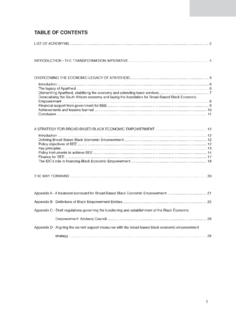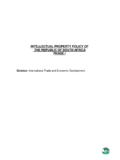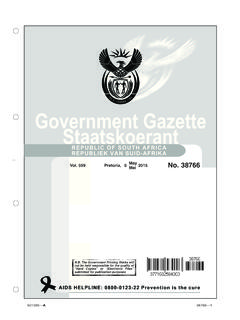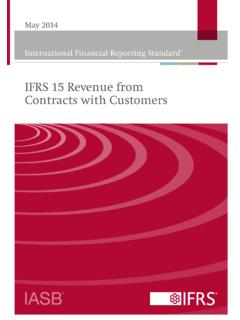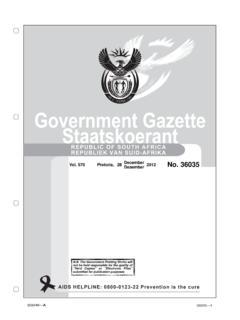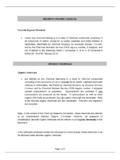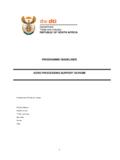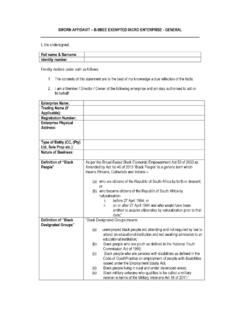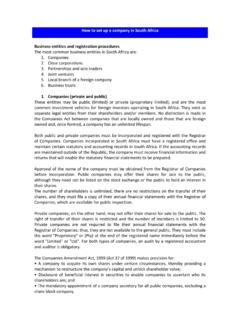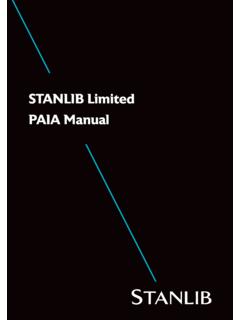Transcription of PRESIDENT'S OFFICE NO. 102 OF 1996: NATIONAL SMALL ...
1 1 PRESIDENT'S OFFICE No. 1901. 27 November 1996 NO. 102 OF 1996: NATIONAL SMALL business ACT, 1996. It is hereby notified that the President has assented to the following Act which is hereby published for general information:- ACT To provide for the establishment of the NATIONAL SMALL business Council and the Ntsika Enterprise Promotion Agency; and to provide guidelines for organs of state in order to promote SMALL business in the Republic; and to provide for matters incidental thereto. (Afrikaans text signed by the President.) (Assented to 12 November 1996.) BE IT ENACTED by the Parliament of the Republic of South Africa, as follows:- CHAPTER I Definitions 1. In this Act, unless the context otherwise indicates- (i) "Agency" means the Ntsika Enterprise Promotion Agency established by section 9; (i) (ii) "Board" means the Board of Directors of the Agency contemplated in section 11; (iii) (iii) "Chief Executive Officer" means the Chief Executive Officer of the Agency appointed as contemplated in section II (1)(b); (vi) (iv) "constitution of the Agency" means the constitution of the Agency contemplated in section 13 and adopted in terms of section 16(1); (ix) (v) "constitution of the Council" means the constitution of the Council contemplated in section 4 and adopted as contemplated in section 8(3); (x) (vi) "Council" means the NATIONAL SMALL business Council established by section 2.
2 (xv) (vii) "Director-General" means the Director-General of the Department of Trade and Industry, or an officer of that Department designated by that Director-General; (iv) (viii) "Minister" means the Minister of Trade and Industry; (xi) 2(ix) " NATIONAL Coordinator" means the NATIONAL Coordinator of the Council appointed as contemplated in section 6(1); (xiii) (x) " NATIONAL SMALL business Support Strategy" means the NATIONAL policy in respect of SMALL business support as published by the Minister in the Gazette, and includes the policy as stated in the White Paper on NATIONAL Strategy for the Development and Promotion of Sinall business in South Africa (Notice No. 213 of 1995, published in Gazette No. 16317 of 28 March 1995); (xii) (xi) "prescribed" means prescribed by regulation; (xvii) (xii) "provincial council" means a provincial SMALL business council for SMALL business established under the constitution of the Council; (xiv) (xiii) "regulation" means any regulation made under this Act; (xvi) (xiv) "service provider" means any public or private entity providing support services to SMALL business .
3 (ii) (xv) " SMALL business " means a separate and distinct business entity, including cooperative enterprises and non-governmental organisations, managed by one owner or more which, including its branches or subsidiaries, if any, is predominantly carried on in any sector or subsector of the economy mentioned in column I of the Schedule and which can be classified as a micro-, a very SMALL , a SMALL or a medium enterprise by satisfying the criteria mentioned in columns 3, 4 and 5 of the Schedule opposite the smallest relevant size or class as mentioned in column 2 of the Schedule; (vii) (xvi) " SMALL business organisation" means any entity, whether or not incorporated or registered under any law, which consists mainly of persons carrying on SMALL business concerns in any economic sector, or which has been established for the purpose of promoting the interests of or representing SMALL business concerns, and includes any federation consisting wholly or partly of such association, and also any branch of such organisation; (viii) (xvii) "this Act" includes the regulations.
4 (v) CHAPTER 2 NATIONAL SMALL business Council Establishment of NATIONAL SMALL business Council 2. The NATIONAL SMALL business Council is hereby established as a juristic person. Functions of Council 33. (1) The functions of the Council are to- (a) represent and promote the interests of SMALL business , with emphasis on those entities contemplated in the NATIONAL SMALL business Support Strategy; and (b) advise the NATIONAL , provincial and local spheres of government on social and economic policy that promotes the development of SMALL business ; (2) The Council may exercise such powers and must perform such duties as are reasonably necessary for or incidental to the performance of the functions mentioned in subsection (1). (3) The Council must perform its functions in accordance with this Act and its constitution.
5 Constitution of Council 4. Subject to this Act and the NATIONAL SMALL business Support Strategy, the constitution of the Council must, among others, provide for- (a) the composition of the Council consisting of- (i) 18 members of which each provincial council elects two members from their number; and (ii) if the members referred to in sub paragraph (i) so elect, five members appointed in an expert or representative capacity; (b) a provincial council for each province consisting of members elected by SMALL business organisations that meet the criteria set out in the constitution; (c) subject to this Act, and in order to achieve the objects contemplated in section 3, the powers and duties of the Council and the provincial councils; (d) criteria for the appointment and procedures for the election of the members referred to in paragraphs (a) and (b); (e) the appointment of any alternate member to act during the absence or incapacity of a member of the Council or a provincial council; (f) the election of OFFICE bearers of the Council and provincial councils, their functions, and the circumstances and manner in which they may be removed from OFFICE ; (g) a two year tenure for members of the Council and provincial councils; 4(h) the circumstances and manner in which membership of the Council and provincial councils may be terminated and procedures for the filling of vacancies.
6 (i) the establishment and functioning of committees, including a management committee for the Council and provincial councils; (j) the co-opting as a member of any person to assist the Council, a provincial council or any committee in the consideration of any particular matter; (k) the rules for the convening and conducting of meetings of the Council and provincial councils, including the quorum required for and the minutes to be kept of those meetings; (l) the voting rights of the different members and the manner in which decisions are to be taken by the Council and provincial councils; (m) the provision of administrative personnel employed by the Council to assist provincial councils in the performance of their functions; (n) subject to section 7(2), the banking and investment of funds by the Council and provincial councils; (o) the determination through arbitration of any dispute concerning the interpretation or application of the constitution of the Council; (p) the delegation of powers and assignment of duties to members, committees and employees, provided that- (i) the Council or a provincial council may not be divested of any power or duty by virtue of the delegation or assignment; and (ii) the Council or a provincial council, as the case may be, may vary or set aside any decision made under any delegation or in terms of any assignment; (q) a procedure for amending the constitution of the Council.
7 Remuneration of members, alternate members and co-opted members of Council and provincial councils 5. (1) The Minister, with the concurrence of the Minister of Finance, determines the salaries, allowances and conditions of service of members, alternate members and co-opted members of the Council and provincial councils who are not in the full-time service of the State. (2) The salaries, allowances and conditions of service of the persons referred to in subsection (1) may differ according to the different offices held by them, the different functions performed by them, or whether they serve in a full-time or part-time capacity. 5(3) Persons referred to in subsection (I) who are in the service of the State may not receive additional remuneration for serving on the Council or any provincial council, but may be reimbursed for expenses incurred in the performance of their functions in such last-mentioned service.
8 Staff of Council 6. (1) Work incidental to the performance of the functions of the Council is performed by a NATIONAL Coordinator, who must be appointed by the Minister, after consultation with the Council. (2) The NATIONAL Coordinator may be assisted by- (a) persons appointed by the Council; (b) officers in the public service seconded to the service of the Council in terms of any law regulating such secondment. (3) The conditions of service, remuneration and service benefits of the NATIONAL Coordinator and the personnel appointed by the Council must be determined by the Council, with the concurrence of the Minister and the Minister of Finance. (4) If the NATIONAL Coordinator is for any reason unable to perform his or her functions, the Council may designate a person in its service to act as NATIONAL coordinator until the NATIONAL Coordinator is able to resume OFFICE .
9 Finances of Council 7. (1) The funds of the Council consist of- (a) money appropriated by Parliament; (b) grants, donations and bequests made to the Council; (c) money lawfully obtained by the Council from any other source, but loans raised by the Council are subject to approval of both the Minister and the Minister of Finance. (2) All money received by the Council must be deposited in a banking account in the name of the Council with a bank established under the Banks Act, 1990 (Act No. 94 of 1990), or a mutual bank established under the Mutual Banks Act, 1993 (Act No. 124 of 1993). (3) The financial year of the Council begins on I April and ends on 31 March of the following year. 6(4) The NATIONAL Coordinator is the accounting officer of the Council and must ensure that- (a) proper record of all the financial transactions, assets and liabilities of the Council are kept; and (b) as soon as possible, but not later than three months after the end of a financial year, accounts reflecting the income and expenditure of the Council and a balance sheet of the assets and liabilities of the Council as at the end of that financial year are prepared.
10 (5) The accounts and balance sheet referred to in subsection (4)(b) must be audited by the Auditor-General. Transitional provisions in respect of Council 8. (1) For the purposes of this section, but subject to this Act, the council of the " NATIONAL SMALL business Council", an association incorporated under section 21 of the Companies Act, 1973 (Act No. 61 of 1973), and with the registration number of 96/08177/08, is deemed to constitute the Council. (2) The Director-General must- (a) as soon as practicable convene a meeting of the Council; (b) determine the procedures for the meeting; and (c) chair that meeting. (3) The purpose of the meeting and any subsequent meeting which may be necessary is to define a procedure for the adoption of the constitution by a representative body as contemplated in section 4(a)(i).
